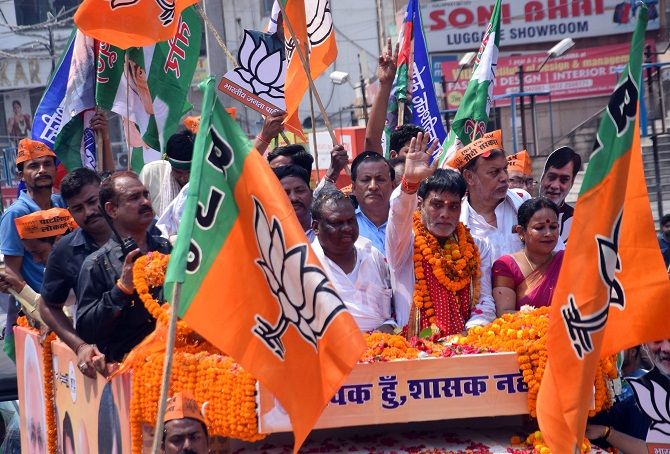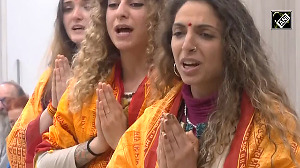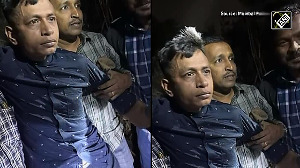'Everything changed in October 2015, when two children Vaibhav and Divya were charred to death at Sunpade in NCR Town Faridabad, when Rajput strongmen torched their household.'
'This was the beginning of disenchantment of Dalits with the BJP. Since then, every incidence of atrocity and government inaction against the perpetrators, has strengthened this.'

Ashok Bharti, chairman, All India Ambedkar Mahasabha; and principal advisor, National Confederation of Dalit and Adivasi Organisations, talks to Aditi Phadnis on the growing Dalit disenchantment with the ruling party and where does the future of Dalit leadership lie.
Are you seeing evidence of Dalit disenchantment with the Bharatiya Janata Party (BJP) and when did it begin?
Certainly, Dalit disenchantment with the BJP is widespread. This disenchantment is not localised or limited to a few states or regions. It is nationwide; and has continuously been growing for last few years.
In 2014, Dalits voted in large numbers in favour of the BJP. Like others, they also accepted Prime Minister Narendra Modi's pitch for developmental transformation of government and governance. The Rashtriya Swayamsevak Sangh's (RSS) resolve, "one well, one temple, and one crematorium" to end the exclusion of Dalits was significant.
But everything changed in October 2015, when two children Vaibhav (three) and Divya (nine-month old) were charred to death at Sunpade in NCR Town Faridabad, when Rajput strongmen torched their household.
Instead of condemning the act of his caste men, one Rajput minister in the government made derogatory comments about Dalits. Dalits demanded action against the minister, but no one cared.
This was the beginning of disenchantment of Dalits with the BJP. Since then, every incidence of atrocity and government inaction against the perpetrators, has strengthened this.
Apart from this, the government's actions or lack of action on critical interests of Dalits such as reservation, reservation in promotion, judicial pronouncements due to poor defence by the government resulting in dilution of constitutional rights or well-being of Scheduled Castes and Scheduled Tribes has also contributed to this disenchantment.
PM has repeatedly invoked Dr Ambedkar as a source of his inspiration. He has washed the feet of scavengers at Kumbh Mela. His ministers are eating in Dalit homes, making common cause with them. The BJP has changed many candidates in reserved constituencies. Has all this had some effect?
There is no doubt that the PM has repeatedly invoked Dr Ambedkar and much more than any other PM in the country. He has publically admitted his humble background and has attributed his election as PM to the Constitution and Dr Ambedkar. There is no doubt that his government has constructed Dr Ambedkar memorials, which saw no progress in many previous regimes.
In our country, where two-cup system, one for Dalits and other for the non-Dalits, still exists in large parts of the country, one requires huge courage to wash the feet of scavengers publically. Even if it was for the optics, washing the feet of the scavengers by none less than the India's executive head is historic.
This signifies that the Dalits are coming of "age" where no one could undermine their political worth; and the scale is now tilting from upper caste to the so-called lower castes. The ministers eating in Dalit homes, making common causes with them is the continuation of what the PM has been directing.
But, follow-up on these acts of reverence, washing feet or having common meal with the Dalits by robust policy framework, ensuring equal dignity, development and justice to the Dalits, remains largely ignored. It would have been much better had the government strengthened the mechanism, machinery, budgetary allocations to ensure Dalits their constitutional rights as enshrined in the Constitution.
Members of Parliament who were elected on the reserved seats, could have lobbied for a "fair deal" for the Dalits in the government. They could have also alerted the PM or the government on the dissatisfaction of the community, but they failed to do so and it was natural in the design of selection of the candidates for the reserved seats.
In present political electoral systems, parties choose candidates from among its members and not the leaders of the community. In my opinion, it is all linked to Dalit disenchantment.
What is the evidence that the political compact between Dalits and Yadavs is also a social compact?
In 1993, the Bahujan Samaj Party-Samajwadi Party (BSP-SP) representing Dalits and Yadavs (OBCs) were joined by others and they formed the government. Currently, the SP-BSP-RLD (Rasthriya Lok Dal) in Uttar Pradesh and Rashtriya Janata Dal-Rashtriya Lok Samta Party-Hindustani Awam Morcha-Vikassheel Insan Party (RJD-RLSP-HAM-VIP) in Bihar are the political compact leading socially marginalised communities.
But, in order to understand this as a social compact, one must ponder over the caste and varna dynamics of the Indian society. In the varna system, Yadavs or the OBCs are part of the shudra varna and touchable. But Dalits are not the shudra; are outside the varna; and are untouchable.
One must look at the individual Caste/Tribe Census of Scheduled Castes and Scheduled Castes, which simply indicates that in most of the states, five-six castes/tribes out of 30 to 100 state specific castes/tribes form the 85 to 95 per cent of the Scheduled Castes or the Scheduled Tribes.
Usually, one or two state specific caste/tribes dominate the population of these communities in all the states. Same is true for the Other Backward Castes in most of the states.
Therefore, once political compact between the Dalits and Yadavs (or OBCs) is in place, this enhances proximity and their social interaction significantly.
Both, the Dalits and the OBCs, have faced or continue to face exclusion, humiliation and domination from the same varna groups. Therefore, as soon as they join in political compact, social leadership gets active for social compact. In Hindi heartland, specifically in Uttar Pradesh and Bihar, mobilisation of Dalits and Yadavs is much larger than any other OBCs.
Incidentally, in both the states, Yadavs are the most numerous OBCs and Dalits have significantly large population.
How do you see the future of India's Dalit mobilisation? Its leadership?
I see India's Dalit mobilising more and more. They have learnt that social contract signed between Hindu leaders, including India's business interests led by Mahatma Gandhi and Dr Ambedkar as Poona Pact in 1932, has been made redundant.
Commitment of the State, which is reflected in policy framework, its representation in court cases, budget allocations for the socio-economic development, representation of Dalits in top bureaucracy, judiciary and outsourcing etc, is declining.
A large reservoir of talent, creativity and innovations, Dalits are constrained by their leadership, be it their own, regional or national political parties.
But, they are innovating and a new Dalit leadership could be seen at the horizon. They are leading national platforms like National Confederation of Dalit and Adivasi Organisations, All India Confederation of SC/ST Employees Associations, Rashtriya Dalit Mahasabha, National Campaign for Dalit Rights, Rashtriya Dalit Mahila Andolan, All India Mahila Adhikar Andolan etc. They have a robust system of Dalit-bahujan youtube channel, which is growing day by day.
All these may be in infancy, but are indicative of the future leadership. This leadership is not limited to reservation or atrocities on Dalits, but has a larger development canvas.
What do you think the nature of the opposition will be in the next five years?
The nature of opposition in the next five years would be creative disruption. This would compel the conscience of this country to re-invent its national project of Dalit empowerment. This opposition will inspire Dalit leadership to mobilise for distributive justice.
We will not tolerate any effort to dilute or limit the fundamental freedoms and the idea of equality, liberty, justice and fraternity. We will leave nothing at our disposal to oppose anything that curtails our constitutional rights and the duties of the state towards the weak and the needy.
Lastly, being a huge success story of human advancement, Dalits would like to upscale our success. Hardly having any assets, land, industry or wealth, but Dalits have immensely contributed in creating and sustaining all of these in India.
At a time, when India's success inspires people globally, our opposition would aim at limiting this success to only those having a class or the caste. After all, we also have a dream.












 © 2025
© 2025